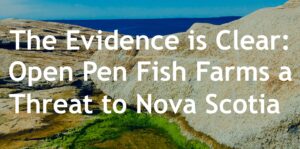
Yesterday, the executive director of the Aquaculture Association of Nova Scotia published an editorial in which he accused Thomas Trappenberg, leader of the Green Party of Nova Scotia, of leading a misinformation campaign against his industry.
Lacking evidence and without citing any specific case of misinformation, the attack, which also names the Ecology Action Centre and four citizen-led groups like the Healthy Bays Network, is damaging because it sours what was until now a civil and democratic discussion about an important issue.
The debate about aquaculture is important because our oceans are not just a massive part of our economy, but vital to how we identify ourselves as Nova Scotians.
This is why thousands of people from all political backgrounds, including an independent MLA and three official parties, have formed their own local groups like the ones named by Mr. Smith to educate and organize the discussion around the development of open-pen aquaculture.
These citizen-led movements flooded town halls and MLA offices in shared opposition to open-pen aquaculture, based on conclusions in publicly available scientific studies like a 2018 analysis by Dalhousie University department of biology, and the Cohen Commission Judicial Inquiry in B.C., where demonstrated that the practice was unsustainable in its current form.
When using evidence to support an argument, it is important to show where that information comes from. Mr. Smith points to the Coller-Fairr Protein Index as proof that open-pen aquaculture is a very sustainable practice, however that study was commissioned to “raise awareness of the material ESG risks and opportunities of intensive animal production.” according the website. The data and conclusions are not available to the public but only investors in equity markets.
If Mr. Smith laments a lack of transparency in the open-pen aquaculture debate, then it does not help that his sole publicly available source of supporting documentation comes from a $1.2 million study by the Cooke Industrial Research Chair for Sustainable Aquaculture, a position created and funded by Cooke Aquaculture, a paid member of Mr.Smith’s Aquaculture Association of Nova Scotia. Cooke currently holds the controversial open-pen leases in the province, which were renewed recently with severely limited public debate .
We need a vigorous discussion on economic and resource development in Nova Scotia. “As a physicist, a science professor and as leader of the Green Party, I consider it a requirement to maintain an open mind, to always keep the door open to new information and challenges to established facts, if and when demonstrable new facts come to light.” states Thomas.
“This is the only way we move society forward. Together, with shared facts.”
As of this moment, the facts are that open-pen fish farms often consume more protein than they produce (it takes more food to grow the fish than the food value contained in the fish), and very serious problems of contamination from faeces, antibiotics and sea lice from the farmed fish into the open ocean remain unsolved. Large scale die-offs, like the one that left 10,000 dead salmon in Liverpool Bay reported by CBC last year, cause catastrophic damage to local ocean life. TIANS, the Tourist Industry Association of Nova Scotia, currently endorses closed-pen aquaculture only.
These are the facts.
It is important for Nova Scotians to be properly informed about the issues, and to be clear about the sources of information especially in this era of fake news. Defamatory claims of misinformation are unhelpful, unless of course, they are backed by demonstrable, repeatable facts.

Leave a Reply